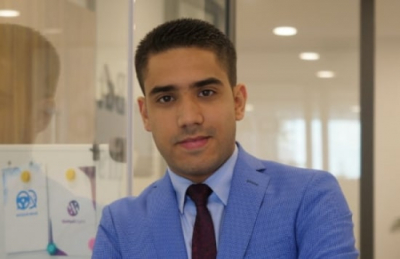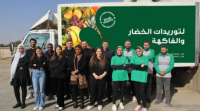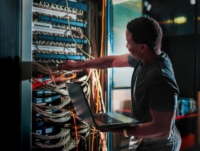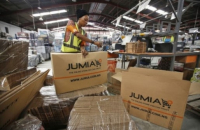Malian pastoralist communities now have a digital solution to help them identify good pastures for their herds. The solution -STAMP (Sustainable Technology Adaptation for Mali’s Pastoralists) - is the fruit of a public-private partnership between the Malian Ministry of Agriculture, Livestock and Fisheries, Orange-Mali, the herders' organization "Tassaght," the international remote sensing service provider HSS, and the Netherlands International Development Organization (SNV). It was launched in 2017, the year in which the service won the 1st Orange Prize for Social Entrepreneurship Mali.
STAMP is a response to the grazing problems of pastoral populations in the Gao region, where industrial and agricultural activities, human and animal overpopulation, and climate change have reduced resources for livestock. The solution provides the beneficiaries with geo-satellite information on the availability and quality of biomass for feeding their livestock, the availability of surface water for watering, and also the concentration of animals around these resources. It also provides information on livestock and grain prices, as well as advice on animal health and financial products for livestock farmers. Users only have to call a center managed by Orange Mali or dial a USSD code on basic mobile phones to instantly obtain important data for their movement.
On December 17, 2020, during a press conference in Bamako, Thomas Sommerhalter, the STAMP project manager explained that the "producer surveys (carried out as part of the project, ed) revealed that reliability and the need for timely information are key to decision-making by pastoralists."
STAMP also integrates two other services to help farmers obtain information on weather, planting methods, seeds, planting time, fertilizers, etc. The head of the corporate social responsibility division at Orange Mali, Abdoul Malick Diallo, explained that the client advisors speak local languages, including Fulani, Dogon, Songhai, and Bamanankan to facilitate talks with the community.
Ruben Tchounyabe
Tech4dev announced it is launching a new edition of its women Techsters fellowship. The non-profit social enterprise wants, through this initiative, to bridge the digital divide between men and women in the tech sector.
The training combines theory and practice to give women the opportunity to enter the job market. It is specifically designed for technology novices who are encountering technology for the first time. Applicants for the scholarship must be between the ages of 16 and 40 and reside in one of the following countries: South Africa, Nigeria, Ghana, Kenya, Ethiopia, DR Congo, Tanzania, Uganda, Algeria, South Sudan, Morocco, Angola, Mozambique, Madagascar, and Egypt.
Successful candidates will be trained in the skills of blockchain, cybersecurity, data science and artificial intelligence engineering, mixed reality/3D animation, mobile application development, product design (UI/UX), product management, and software development.
The Women Techsters Fellowship Program aims to increase the number of girls and women with improved livelihoods and access to digital jobs. The program will begin in May 2022 for one year, including 6 months of intensive training, followed by a 6-month internship. At the same time, learners will participate in a mentoring program to help them build technology careers and technology-based businesses. Applications are due by March 22, 2022.
Vanessa Ngono Atangana
Pascal Kanik is bringing the digital into schools in DR Congo with his startup Schoolap, a digital platform that provides students with access to digital lessons and transforms the way teachers teach in schools.
He created the startup in 2017 alongside another entrepreneur, Guy-José Leta. The idea of setting up this tool was born while he was on a work mission as a Vodacom employee to raise awareness about sustainable development in the country's provinces. “I realized the lack of quality learning in the areas I visited. I noticed that teachers don't know what sustainable development is. I then wondered how they could teach something they don't know,” he says. He then decided to bring quality lessons to them. Access to the digital platform is free and lessons can be downloaded to any device.
Schoolap also incorporates a tablet for those who wish to purchase it. The courses available meet the criteria and requirements of the Ministry of Education. "There are even courses in sign language for deaf and dumb people, and cartoons for kids," he adds.
Pascal Kanik won several international awards for his innovation and has even sold the concept to Seychelles. In April 2019, Schoolap won the award for best online education platform at Seedstars, a startup competition focused on emerging markets. That same year, the entrepreneur entered into a funding agreement with CFC, and subsequently raised $500,000 from the international Eutelsat Group, which accelerated his penetration of the Congolese market.
Schoolap has become increasingly successful with the lockdown imposed due to Covid-19. According to Pascal Kanik, the platform already has more than 20,300 educational content, a network of more than 6,000 schools, 1,900,000 students, and 105,000 teachers. The startup wants to reach 28,000 schools in the long term and conquer new markets.
Schoolap recently established an adapted bank loan with RawBank, the country's main bank, to enable the delivery of more than 10,000 tablets by the end of this year, much more than the 500 tablets sold monthly at the beginning of its marketing in 2021.
Aïsha Moyouzame
Over the past five years, Gabon has performed well in the UN e-government development index. Despite this progress on paper, not much has changed on the ground.
Société d'incubation numérique du Gabon (SING), a private company providing digital innovation services, announced the launch of the SmartGov program last February 25. The initiative is part of the government’s ambition to digitize public services and make the administration more collaborative and efficient.
"Services need to communicate with each other so that they are faster and more efficient," said Yannick Ebibie (pictured), MD of SING. "Even though the country is the highest-ranked in terms of e-government in the Central African region and among the best on the continent, people still have to queue for hours at ministries to access services. And sometimes not everything on the website is updated," he said.
Gabonese authorities have made digital transformation a priority since 2009. The ambition is to make Gabon a model of digitalization in Africa by 2025. To support the migration of Gabon from e-Government to Smart Government, the SING also launched a three-day hackathon. During this event, SING will select and fund the best ideas, capable of facilitating the entry of public administrations into a more collaborative vision. CFA1 million (nearly $1,700) will be granted to the winners with a three-month technical assistance period.
Brice Gotoa
South African cryptocurrency exchange platform valr.com announced yesterday it has raised more than R750 million (about $50 million) in a Series B round to finance its expansion strategy. This deal represents the largest cryptocurrency fundraising ever in Africa, according to the company, which is currently worth $240 million,
Under its plans, VARL wants to expand into India, while strengthening its presence in Africa. “We believe that Africa’s future is bright for the adoption of cryptocurrencies for both asset diversification and payments. VALR brings an amazing product and service to onboard both retail customers and institutions,” said Paul Veradittakit, partner at Pantera Capital, the company that led the transaction.
Two years ago, in July 2020, VARL benefited from a $3.4 million Series A funding. The resources were used to develop new products and expand into new African markets. The cryptocurrency exchange platform claims to have processed more than $7.5 billion in transaction volume since its launch in 2019. It also claims more than 250,000 retail clients and 500 institutional clients on the continent.
According to an August 2021 study published by research platform Chainalysis, the African cryptocurrency market grew by 1,200% in value between July 2020 and June 2021. Despite this growth, the continent represents the smallest cryptocurrency economy of all regions studied by Chainalysis.
Chamberline Moko
Moroccan Nizar Berdai (pictured), 25, is becoming a model of student entrepreneurship. He owns two startups: WeMash Digital, which specializes in digital transformation, and Wsselni Maak, which is a ride-sharing solution. This year, the young entrepreneur who is currently pursuing a master's degree in strategy and finance at Sciences Po Paris wants to focus on expanding his car-sharing solution.
Before becoming an entrepreneur, Nizar Berdai obtained a bachelor's degree in Salé, Morocco, then moved to Canada in 2015 to study finance and political science at HEC Montreal and McGill University. He was very active in the community and was a member of the Quebec Youth Parliament.
The idea to create a business came up to him while he was preparing for his master's degree at ESSEC Paris. He then created WeMash Digital, a startup specialized in communication consulting and digital transformation. Very quickly, he landed contracts with clients including Moroccan public sector organizations and NGOs such as Oxfam Morocco. At the same time, he refined a carpooling project and launched in February 2021, Wsselni Maak.
The student currently enrolled in a Master 2 in Finance and Strategy, at Sciences Po Paris, claimed Wsselni Maak receives an average of 450 offers and requests per day. In less than a year, the startup has more than 20,000 users in Rabat, Salé, Témara, Casablanca, Agadir, and Fez.
Nizar Berdai is now working to increase the service’s user base through partnerships with companies that will be announced, he says, in the coming days.
Aïsha Moyouzame
Agritech investment remains low in Africa despite great successes by some startups. Egyptian agritech startup FreshSource Global announced last February 28 it has secured seed funding to finance its expansion. The B2B platform, which connects farms to businesses in Egypt and provides last-mile solutions, said it has raised an undisclosed “seven-figure” round in dollars from Wamda Capital, 4DX Ventures, and some angel investors.
“We are planning to use the funds to expand our team and invest more in our technology. Also, we are going to be covering all of Egypt’s governorates by the end of 2023. By 2024, we will start considering a global expansion plan,” said co-Founder Farah Emara. She believes the new resources will help "accelerate our mission to create more sustainable fresh food systems through data and technology to transform the lives of producers, businesses and consumers and improve the planet."
FreshSource acts as an intermediary between agricultural producers and businesses such as supermarkets. The company founded in 2018 and launched in 2019 relies on a digital platform through which it centralizes supply from farmers and demand from retailers. It ensures that customers' needs are met by reducing the number of intermediaries through which agricultural products pass. It also ensures the safety of agricultural products, particularly in terms of preservation and transportation to the buyer.
By 2020, FreshSource was already claiming 300 local farmers as users of its service, creating 1,500 jobs and also having prevented 200 tons of food loss. According to Farah Emara, "By reducing food waste, you reduce the cost of fresh food and enable a segment of the population that couldn't afford it before to live a healthier lifestyle. Also, this method increases producers’ income and thus improves their quality of life.”
Adoni Conrad Quenum
Household waste management has been a major problem in African cities for several years. A Malagasy startup has entered the sector using digital technology to protect the planet.
In Madagascar, like the rest of the world, as the population grows, the volume of waste produced also grows; 50% of garbage in the country still ends up in the streets according to the NGO Ran'Eau. In 2017, the local startup Greentsika launched its household waste collection service using digital tools. Tested and deployed in Tuléar, in the south of Madagascar, the solution is the result of a collaboration with the German NGO Welthungerhilfe, which handles the transportation of waste to landfills.
Greentsika’s service is accessible via mobile phone, email, social networks, or directly at the company's offices. The solution offers various means of payment, including mobile money transfers, bank transfers, checks, and cash. The monthly subscription fee for a household starts at 4,000 ariary ($1), for two to six pickups per week of a 50 kg bag of waste. The fee for businesses (hotels, restaurants, schools, government offices, etc.) starts at 20,000 ariary. The subscriber company chooses the days it wants to have the waste collected and the agent who is dedicated to it.
Subscribers are given a card with a barcode that Greentsika's agents will scan at each garbage pickup. The unique barcodes allow Greentsika to have reliable data on the number of pickups made in a household or business. They also enable the startup to know the coverage of its agents and track their routes in real-time, and identify the customers who have paid their subscription. Rajaofera Gaëtan, one of the four co-founders of Greentsika, said the entire system is cloud-based.
Greentsika, accelerated by Orange Fab Madagascar in 2019, already claims 2,300 customers, 160 garbage pickups per day for 7 tons of waste collected daily. The startup aims to cover the entire city of Tulear and enter other cities, creating more job opportunities. In 2020, Rajaofera Gaëtan estimated that 5 to 6% of households in Tulear were covered.
Adoni Conrad Quenum
Demand for broadband connectivity is growing in Africa. So are the risks of cybercrime. Improving supply while protecting access has become a necessity to ensure the region's development.
The Internet Corporation for Assigned Names and Numbers (ICANN) announced yesterday it will soon deploy two root server clusters in Africa. One is confirmed to be installed in Kenya. The two technical infrastructures will allow Internet queries from Africa to be processed locally, without depending on networks and servers located in other parts of the world. It will also improve network quality by reducing latency throughout the region.
According to the international non-profit organization - which coordinates the domain name system and plays a key role in maintaining a global, interoperable and secure Internet – the clusters “will reduce the time it takes for a website to load, particularly when there are spikes in Internet usage. This will bring immediate benefits for everyday Internet users across the continent.”
The root servers will also reduce the impact of a potential cyberattack on the continent. Distributed denial of service (DDoS) cyberattacks aim to overwhelm servers with a flood of queries. The technical infrastructure will allow for greater bandwidth and data processing capacity, reducing the risk of Internet downtime due to a cyber-attack.
ICANN's investment in Africa is part of the ambitions of the Partner2Connect digital coalition launched on September 20, 2021, by the International Telecommunication Union (ITU). The goal is to drive meaningful connectivity and digital transformation globally in line with the African Digital Transformation Strategy (2020-2030).
Currently, only 33% of the African population has access to the Internet, according to ITU. With the digital transformation accelerating and inducing high Internet consumption, the Union believes that the rate will increase rapidly in the coming months.
Muriel Edjo
E-commerce company Jumia has unveiled plans to upgrade its payment solutions in Egypt and Nigeria, where it is the most active. In the first country, the company said it has reached an agreement with vaIU, a financial technology services company, to develop a solution that will allow its local customers to buy goods and pay for them over time (BNPL, Buy Now and Pay Later).
In its main market, Nigeria, Jumia said it has added new services to its payment app. “On the JumiaPay app, we continued adding more relevant everyday services. In Nigeria, we set up an integration with Quickteller, the largest billing aggregator in Nigeria. This partnership allows us to offer over 70 additional billers on the JumiaPay app, including Government services, internet service providers, airlines, and many more,” the company said.
To comply with the Central Bank's requirements, Jumia agreed to partner with a third-party payment service provider to process card transactions via JumiaPay. “This change, which is expected to take effect in March 2022, may temporarily affect the payment experience in Nigeria and negatively impact payment volumes on the platform,” Jumia warned.
JumiaPay's technology enabled the group, now listed on Nasdaq (the main U.S. tech stock market), to channel $263.3 million worth of payments for more than 12.1 million transactions. This represents 34.7% of overall customer payments, up from 33.1% a year earlier. The value of goods purchased through the Jumia platform approached $1 billion in 2021, up 3.21% compared to that of 2020.
Jumia continues to grow its customer base, which was nearly 4 million in 2021. The improvement of its payment systems and compliance with regulatory requirements are important steps in its development.
More...
Building on the general-purpose e-learning platform -Atingi- that it launched in November 2020, Smart Africa has announced the launch of a new platform dedicated to technology and digital literacy.
On the sidelines of its 5th ICT Ministers’ Council held last February 25 in Kintélé, in the Republic of Congo, the Smart Africa Alliance announced the launch of its academy designed to improve the digital skills of Africans. The Smart Africa Digital Academy (SADA) offers free online courses accessible on https://sada.atingi.org/.
SADA's courses are focused on seven areas: digital skills and transformation, management and leadership, agriculture, career guidance, entrepreneurship, health, and governance and decentralization. Currently, three courses are already available on the platform. These are "Economic Foundations of Regulation" developed by Laurent Gille, economist, professor emeritus of Télécom Paris; "ICT Infrastructure" developed by UNESCO, Cetic.br/NIC.br and the SDG Academy; and "Dimensions and Causes of the Digital Divide" developed by GIZ and Atingi.
Smart Africa has also scheduled a webinar for September 22 to discuss the "Agile Regulation for Digital Transformation" in Africa. The workshop will feature Patrick Njoroge, the head of the Central Bank of Kenya, Anna Pietikainen, senior policy advisor at the OECD, Edmund Fianko, the deputy head of the National Communications Authority of Ghana, and Roslyn Docktor, director of government and regulatory affairs at IBM Corporation.
"The Smart Africa Digital Academy – SADA for short – provides the courses, webinars, and opportunities for exchange to policymakers and regulators to promote digital transformation in Africa. With its various learning programs and formats, SADA wants to improve participants’ skills for drafting inclusive, gender-sensitive, and climate-smart ICT regulations,” according to the information available on the Atingi platform.
“SADA also reaches a wider audience from entrepreneurs to engaged citizens to improve their digital literacy, so that they can fully benefit from the new potentials offered by digital technologies.”
SADA’s access platform is fully responsive and adapts to a variety of screen sizes, including desktop, tablet, and mobile. Training courses are available in English, French, German, Spanish, Arabic, Vietnamese, Mandarin, and Portuguese. Courses are downloadable.
Muriel Edjo
Burkinabe startup AINO Digital SAS has developed a multi-faceted digital identification bracelet. Called SAUVIE, the device is equipped with a QR code where personal health information and contacts of important people to reach in case of emergency are stored.
With this initiative presented to the public on February 23, AINO Digital SAS wants to ensure that everyone has their personal health information in case of emergency. Scarlett Zongo (pictured, left), CEO of AINO Digital SAS, explains that the solution is "an application for first responders such as firefighters and doctors. Thanks to SAUVIE, the patient's relatives are alerted of the nature of the emergency and the health facility where he or she is being treated". AINO Digital SAS says that for personal safety, the QR codes are encrypted and can only be read by firefighters and health workers using a special device.
AINO Digital SAS donated nine bracelet models to the public when presenting the device. The basic annual cost of the SAUVIE system is $6.83 plus the price of the wristband on which it is mounted (between $1.2 and $1.71). Three billable options are also available with the basic subscription: Alerting the employer in case of emergency ($8.54), Alerting the insurance company ($3.42), and Alerting a relative ($1.71). If the bracelet is stolen, lost, or damaged, the owner must report it to AINO Digital SAS so that the QR code can be canceled. Another one is automatically generated and integrated into the new bracelet.
Supported by Orange Burkina Faso, which does not charge any data fees when reading the QR code, the startup is working with the Ministry of Health to get the solution to be used in health centers and local security services. Scarlett Zongo is convinced that her innovation can improve the health system in Burkina Faso.
Adoni Conrad Quenum
Arielle Kitio is taking a new step in her ambition to develop the digital skills of Cameroonians, particularly women and young people. On February 22, she launched the first edition of the Techwomen Factory initiative, designed to train 179 women in various technological skills including coding.
Founder of the Cameroon Youth School Tech Incubator (Caysti), the young tech entrepreneur has stood out in recent years through various initiatives aimed at developing digital skills among youth.
In 2018, she launched a fun coding educational program for children "ABC Code". The program teaches young people between the ages of 6 and 15 to create digital applications in African languages. Arielle Kitio also has other programs on her agenda, including one for high school teachers. Today, Caysti claims to have trained nearly 29,000 children in Cameroon, as well as 350 teachers and more than 8,000 primary education officials in more than 6 countries in Africa.
Arielle Kitio's initiatives have earned her several international recognitions. The pedagogical tools developed by her organization have been certified by the African Union in its 2018 Education Handbook and by Unesco ICT. She received the 2019 Margaret Award for African Digital Woman and won the global quality education competition organized by Deloitte in 2020. She is a former ambassador of the Next Einstein Forum in Cameroon and a holder of the Techwomen Award from the U.S. Department of State.
Arielle Kitio promotes the inclusion of women in the fields of science and technology. She has been leading this fight since 2015 through her association WIT (Information Technology for Women & Youth). The lady has a rich academic background. In 2011, she obtained a Bachelor's degree in computer science at the University of Yaoundé I, then a Master's degree in computer science with a Cloud Computing option in co-direction with the Institut National Polytechnique de Toulouse in France. She is currently preparing for a Ph.D. in Computer Science, Software Engineering at the University of Yaoundé I.
Ruben Tchounyabe
The Rwandan Parliament approved last February 21 the signing by the government of an €86.5 million loan agreement with the Asian Infrastructure Investment Bank (AIIB). Rwanda wants to accelerate the use of ICTs in public administrations. The agreement was presented in detail by the Minister of Finance, Uzziel Ndagijimana (pictured), and discussed with MPs.
“The aim is to promote the use of technology in development, increase service delivery, and use of big data. This will also enable the innovation agenda and increase job creation in technology but also attract investments. The fiber didn’t reach all areas but this time it will be expanded to reach sectors, more government offices, and other organizations including religious organs,” Ndagijimana said, stressing that the 28-year loan will also be used to provide subsidized access to technology equipment for government agencies. This will make public services faster, more transparent, and more efficient.
The project will be piloted by the Rwanda Information Society Authority (RISA).
Muriel Edjo




